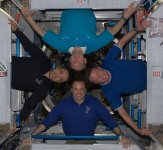You are using an out of date browser. It may not display this or other websites correctly.
You should upgrade or use an alternative browser.
You should upgrade or use an alternative browser.
** The Official Space Flight Thread - The Space Station and Beyond **
- Thread starter Cosimo
- Start date
More options
Thread starter's postsDang it....
Their rocket looks so darn slow of the launch pad compared to other launch vehicles.
The full launch:
If this is possible i would be amazed.
http://news.discovery.com/space/spa...-forgets-parachute-110930.html#mkcpgn=rssnws1
http://news.discovery.com/space/spa...-forgets-parachute-110930.html#mkcpgn=rssnws1
Soldato
- Joined
- 7 Jul 2009
- Posts
- 16,234
- Location
- Newcastle/Aberdeen
Yeah, parachutes might weigh a bit but nothing compared to the fuel you need to land safely, or the extra motors and fuel you would need to make sure you landed in the correct orientation. The case is pretty strong for unpowered descent, be it from a parachute, fixed wing, deployable wing (ala Rogallo), airbag or whatever.
Anyway, i've just heard about the Lunar X-Prize. While i don't doubt that people with the right knowledge could build a rover, and with enough resources could even build a lander - i can't really imagine any of the contenders getting into space in the first place (never mind with enough payload to get to the moon). Eventually perhaps, but certainly not by the deadline.
Anyway, i've just heard about the Lunar X-Prize. While i don't doubt that people with the right knowledge could build a rover, and with enough resources could even build a lander - i can't really imagine any of the contenders getting into space in the first place (never mind with enough payload to get to the moon). Eventually perhaps, but certainly not by the deadline.
Soldato
- Joined
- 7 Jul 2009
- Posts
- 16,234
- Location
- Newcastle/Aberdeen
2015 off the top of my head?
Soldato
- Joined
- 7 Jul 2009
- Posts
- 16,234
- Location
- Newcastle/Aberdeen
Well there's nothing that says they have to make the rocket themselves, would be interesting if someone managed to hitch a ride on an already planned mission but i don't see it myself.
Soldato
- Joined
- 7 Jul 2009
- Posts
- 16,234
- Location
- Newcastle/Aberdeen

Pretty much the only reason i still go on Google+

http://news.discovery.com/space/photos-ron-garan-space-station-odyssey-110929.html
Soldato
- Joined
- 7 Jul 2009
- Posts
- 16,234
- Location
- Newcastle/Aberdeen
Hate to say i told you so 
http://www.breitbart.com/article.php?id=CNG.947744aa7f2a9543ab7c4b0e24b9136c.221&show_article=1

http://www.breitbart.com/article.php?id=CNG.947744aa7f2a9543ab7c4b0e24b9136c.221&show_article=1
This is one day we will look back upon, 4th October 1957. The day the space race began when the first artificial satellite was put into Earth's orbit. That satellite was Sputnik 1:

http://en.wikipedia.org/wiki/Sputnik_1

Sputnik 1
On Oct. 4, 1957, Sputnik 1 successfully launched and entered Earth's orbit. Thus, began the space age. The successful launch shocked the world, giving the former Soviet Union the distinction of putting the first human-made object into space. The word 'Sputnik' originally meant 'fellow traveler,' but has become synonymous with 'satellite' in modern Russian.
This historic image shows a technician putting the finishing touches on Sputnik 1, humanity's first artificial satellite. The pressurized sphere made of aluminum alloy had five primary scientific objectives: Test the method of placing an artificial satellite into Earth orbit; provide information on the density of the atmosphere by calculating its lifetime in orbit; test radio and optical methods of orbital tracking; determine the effects of radio wave propagation though the atmosphere; and, check principles of pressurization used on the satellites.
Image Credit: NASA/Asif A. Siddiqi
http://en.wikipedia.org/wiki/Sputnik_1
Soldato
- Joined
- 7 Jul 2009
- Posts
- 16,234
- Location
- Newcastle/Aberdeen
Sweet,still plenty planned, despite lack of shuttle. Is space even increasing, or am I just paying more attention.
http://www.bbc.co.uk/news/science-environment-15146082
http://www.bbc.co.uk/news/science-environment-15146082
Soldato
- Joined
- 7 Jul 2009
- Posts
- 16,234
- Location
- Newcastle/Aberdeen
Soldato
- Joined
- 27 Apr 2004
- Posts
- 5,549
- Location
- Doncaster, S.Yorks
Something which struck me as odd and interesting from free falling around earth video, Was when it was over the thunder storms below and the lightning flashes, well you could see some of the reflection flashes on the ship itself..quite amazing i thought.
Soldato
- Joined
- 7 Jul 2009
- Posts
- 16,234
- Location
- Newcastle/Aberdeen
Can you even begin to imagine what it would be like to do this?
It's a good video if you can endure the music
Are there any good 'documentaries' on the Soviet/Russian Space Program?
It's a good video if you can endure the music

Are there any good 'documentaries' on the Soviet/Russian Space Program?
Soldato
- Joined
- 26 Dec 2005
- Posts
- 16,135
- Location
- Paisley
Can you even begin to imagine what it would be like to do this?
It's a good video if you can endure the music
Are there any good 'documentaries' on the Soviet/Russian Space Program?
Have you seen this one? Its a Nasa documentary about Apollo-Soyuz.
As amazing as Sputnik was, that video is rubbish
All the films at the time were rubbish and just propaganda.

Now for something different:

Soldato
- Joined
- 7 Jul 2009
- Posts
- 16,234
- Location
- Newcastle/Aberdeen
I don't know if i should find that funny or sickening 


